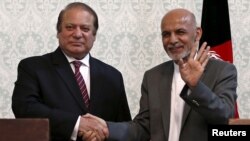Afghan lawmakers on Monday severely criticized and demanded the government explain a “memorandum of understanding” (MoU) the national spy agency has recently signed with its counterpart in neighboring Pakistan.
A rise in high-profile, deadly Taliban attacks in Afghanistan, particularly in Kabul, has sparked criticism that Pakistan is not delivering on its commitment to pressure the insurgents to observe a cease-fire and come to peace talks with the Afghan government.
The MoU requires Afghanistan’s National Directorate of Security (NDS) and Pakistan’s Inter-Services Intelligence (ISI) develop closer cooperation against terrorism.
Officials on both sides say the ISI under the MoU will train and equip the NDS, enabling the institutions to jointly investigate suspects linked to terrorist attacks within their respective countries.
Afghan opposition
Lawmakers debating the issue in the Wolesi Jirga, or lower house of Afghanistan’s parliament, strongly opposed the deal, saying it will “serve no purpose to their nation." They demanded the National Security Council clarify its stance on the MoU.
The Afghan Tolo television station quoted presidential spokesman Ajmal Abedi as saying the agreement between NDS and ISI “is not a new thing.” He added that both the spy agencies in the past had such understandings between them "but now the focus of this agreement is mostly on jointly fighting terrorism."
However, Afghans traditionally critical of Pakistan, such as former NDS chief Amrullah Saleh, have dismissed the contract with ISI as “useless.”
“Intelligence cooperation with ISI means doubting Pakistani duplicity in terror, dishonoring ANDSF's (Afghan National Defense Security Forces) sacrifices and falling in the trap of deception,” Saleh said in a Twitter post Monday.
Pakistani intelligence sources, while confirming the deal between NDS and ISI, are upbeat about its potential benefits, saying it will enable the two sides to effectively counter terrorism threats facing their countries. The sources said that enhanced intelligence sharing and investigation of terror suspects will also enable the two countries to expose both local and external “forces” causing strains in bilateral ties and sponsoring terrorist acts in Afghanistan and Pakistan.
Afghan officials have long accused the Pakistani ISI of secretly maintaining ties to the Taliban to help insurgent commanders take refuge in Pakistan and plan attacks on local, as well as, foreign forces in Afghanistan.
A senior Pakistan government official, while speaking to VOA, dismissed those blaming Pakistan for the rise in Taliban attacks as “detractors” in Afghanistan who have long opposed an improved bilateral relationship.
The official, who requested anonymity, said “there is an improved atmosphere between the two countries with all the things being done in a very transparent manner and sharing of information." He added that if there is something happening from within Afghanistan “they (Afghans) need to take stock of those things and put them right.”
Suspicions and allegations against Pakistan at the official level in Kabul appear to have subsided for the time being in the wake of increased bilateral security cooperation since President Ashraf Ghani’s national unity government assumed charge in Kabul.
Coordinated operations
The Afghan and Pakistani militaries, among other things, have recently conducted coordinated counterterrorism operations along their volatile, mostly porous, 2400-kilometer border.
Afghan army cadets are also for the first time attending training in Pakistan’s premier military academy and the two countries have frequently exchanged top army and intelligence visits in recent weeks to build confidence between the two armies that for decades have been mutually hostile and suspicious.
Afghan Defense Ministry deputy spokesman Dawlat Waziri expressed optimism about Pakistan’s continued support to promote peace and security in his country.
“The more Pakistan can do to help the peace efforts in Afghanistan, the more it will make people of Afghanistan happy,” Waziri told VOA in a recent interview.
He said Pakistani civilian and military leaders have assured the Afghan government of their complete support to help stabilize the war-torn country. “We hope they will live up to their pledges and facilitate efforts aimed at bringing peace to Afghanistan.”
During his trip last week to Kabul, Pakistani Prime Minister Nawaz Sharif publicly condemned the Taliban-led violence in Afghanistan as acts of terrorism, urging the insurgents to cease hostilities and engage in political reconciliation with the Ghani government.
But the militants have responded by increasing attacks within the past few days, mostly focusing on targets in Kabul, killing or wounding both Afghan civilians and foreigners.




